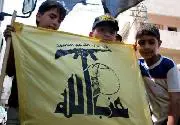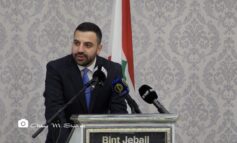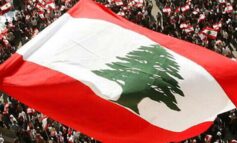Last summer, the sky above Beirut’s southern suburbs was filled with Israeli warplanes; Tuesday night, it exploded with color as Hizbullah supporters came out in force to commemorate “the day of victory” that marked the end of the 2006 war with Israel. Packing an empty-lot-turned-outdoor-auditorium and spilling into crowded streets nearby, they waved Hizbullah and Lebanese flags as color-coordinated balloons bobbed overhead and fireworks shot off periodically.
On five elevated screens, the movement’s leader— Sheikh Hassan Nasrallah — delivered a state-of-the-union address of sorts, evaluating Hizbullah’s position on the one-year anniversary of a United Nations-brokered cease-fire that brought an end to the fighting.

In a 90-minute address, Shaykh Nasrallah explained his take on international politics (the U.S. and Israel want to divide and conquer the Middle East, but they won’t succeed) and updated people on social-welfare programs (rent subsidies will continue for those whose homes still haven’t been rebuilt). Recalling Hizbullah’s destruction last summer of an Israeli warship that was shelling southern Beirut, and saying that no part of Israel was safe from Hizbullah’s rockets, he underscored his main message: We’re victors against terrible aggression and ready, if necessary, for more.
It’s not exactly how the rest of the country views last year’s 34-day battle with Israel, which left more than 1,000 Lebanese dead, 1 million displaced, and billions of dollars worth of buildings and infrastructure damaged.
Nevertheless, it’s the message the resistance group has been reinforcing for the past month to boost morale among supporters. And the message is coming through loud and clear, not just because of Nasrallah’s latest address but courtesy of commemorative events that include speeches, lunches, memorials, a battle reenactment, war exhibit, and a music video.
Most analysts agree that the war yielded no clear winner. Israel caused far more destruction in its enemy’s territory, but didn’t crush Hizbullah or retrieve its two soldiers whose kidnapping triggered the conflict.
Hizbullah mounted a surprisingly capable defense against its southern neighbor and, on that basis, has claimed Aug. 14 as the Day of Victory over what was widely recognized as the region’s most powerful military.
Beyond Shi’i strongholds, Lebanese have shown little interest in commemorating a month’s worth of bombings that exacerbated the already-fragile political situation and struggling economy.
“Most Lebanese don’t even know about [these events],” says Timur Goksel, a security analyst familiar with the group.
Hizbullah has been careful not to further aggravate tensions over the divisive war, confining festivities to the group’s strongholds in south Lebanon, the Bekaa Valley to the north, and Beirut’s southern suburbs.
The only signs of any war commemorations outside Hizbullah neighborhoods are the green banners displayed on all major roads leading in and out of Beirut. “Victory from God,” they read, “We have the surprises.”
But these notices have ruffled feathers in some neighborhoods that don’t support the movement, admits Ghassan Darwish, director of information for the group’s Beirut office.
Over the past month, Hizbullah has organized memorial and prayer services at heavily bombed sites in Beirut’s southern suburbs, each held on location and on the date of destruction.
At one last week, Hizbullah “patriotic songs” welcomed guests over a loudspeaker as they took their seats. A sheikh recited Qur’anic verses and melancholy poetry about the victims of the bombing as a slide show looped through photos of each one. Relatives expressed their grief, while a neighbor named Mustafa said, “On the blood of these people the victory was won.”
Hizbullah has also held lunches for families of war victims. And it reenacted Hizbullah’s rocket attack on the Israeli warship.
A seven-week war exhibit in Beirut’s southern suburbs displays other war booty, including battered Israeli tanks. Visitors begin their tour by entering a fake Hizbullah bunker complete with living quarters and an operations room. From there, they can stroll through an air-conditioned tent that features pro-war quotations from American and Israeli leaders, a video game simulating Hizbullah battles, and other wartime photos and memorabilia.
The exhibit is “very nice,” says a chaperone of about 60 schoolboys here on a field trip. “It solidifies the idea that [Hizbullah] defeated the powerful Israeli army.”
But more important than these “small” events attracting a couple thousand each, says Mr. Darwish, are Nasrallah’s appearances. As the grand finale of Tuesday’s speech – his third televised one in the past month – Nasrallah declared for the first time that Hizbullah had “big surprises” planned if Israel invaded again.
“[The speech] was very strong and very moving,” says Aly, a spectator visibly awed by Nasrallah’s promise. “Israel shouldn’t think about making war because we’re always ready.”






Leave a Reply